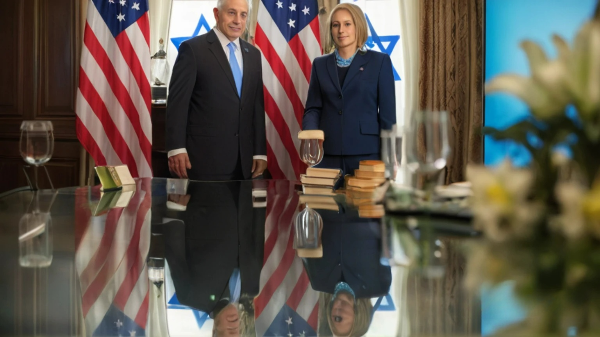Iran’s Plan to Strike Back Against the U.S.
Iran’s Military Preparations Following U.S. Attacks
Loading...

The de facto presidential nominee highlights the plight of Palestinians while navigating the complexities of the divisive conflict.
U.S. Vice President Kamala Harris has vowed not to remain “silent” about the suffering in Gaza, shifting focus to the plight of Palestinians as she navigates the divisive conflict within her Democratic Party.
Speaking to reporters after meeting with Israeli Prime Minister Benjamin Netanyahu in Washington on Thursday, Harris reaffirmed her unwavering commitment to Israel’s existence and security, but noted that “far too many” innocent civilians had been killed in the war.
“What has happened in Gaza over the past nine months is devastating. The images of dead children and desperate, hungry people fleeing for safety, sometimes displaced for the second, third, or fourth time,” Harris said.
“We cannot look away in the face of these tragedies. We cannot allow ourselves to become numb to the suffering. And I will not be silent.”
Harris, the presumptive Democratic nominee following President Joe Biden’s decision not to seek re-election, said she urged Netanyahu to agree to a U.S.-backed ceasefire proposal.
“It is time for this war to end and end in a way where Israel is secure, all the hostages are released, the suffering of Palestinians in Gaza ends, and the Palestinian people can exercise their right to freedom, dignity, and self-determination,” Harris said.
She also reiterated her support for Israel’s right to defend itself, condemned Hamas as a “brutal terrorist organization,” and listed the names of five U.S. citizens believed to be in Hamas’s captivity in Gaza, as well as two others whose remains are believed to be in the enclave.
“I have met with the families of these American hostages multiple times now, and I have told them each time they are not alone and I stand with them, and President Biden and I are working every day to bring them home,” she said.
Acknowledging the divisions over Israel and Gaza, Harris called on Americans to recognize the “complexity” and “nuance” of the conflict.
“Too often, the conversation is binary, when the reality is anything but,” Harris said.
While her remarks did not indicate significant policy differences with Biden, her emphasis on Palestinians’ suffering contrasted with Biden’s more subdued, mostly back-channel efforts to restrain Israel.
Biden’s policy on Gaza has alienated progressive factions of the Democratic Party and many Muslim-Americans, particularly in Michigan, a key swing state in the upcoming election.
Reporting from Washington, noted that Harris spent more time addressing the suffering of Palestinians than Biden has, even as she bolstered her credentials as a pro-Israel figure.
“She talked about the number of starvations. The number of people who are food insecure. The number of people who have had to move several times. She talked about seeing pictures of dead children,” Culhane said.
“You don’t see that in the U.S. media. You don’t see it on the front pages of newspapers. Almost hardly at all. There is very little discussion about the plight of the people in Gaza.”
During her failed 2020 presidential run, Harris positioned herself to the left of Biden, but she has a long history of strong support for Israel.
After entering the U.S. Senate in 2017, her first overseas trip was to Israel, and one of her first acts in office was to introduce a resolution opposing a United Nations Security Council resolution condemning the country.
Harris also spoke at the American Israel Public Affairs Committee’s (AIPAC) annual convention that year, asserting that the bonds between the U.S. and Israel were “unbreakable” and “we can never let anyone drive a wedge between us.”
In an interview with an Israeli news site on Tuesday, Israel’s ambassador to the U.S., Michael Herzog, said Harris’s overall record was “positive,” but she had made “quite a few problematic statements” about the war in Gaza.
Iran’s Military Preparations Following U.S. Attacks
Troops remain in five strategic locations, raising fears of renewed tensions and long-term occupation.
Opposition forces have taken control of the capital after a significant offensive. Here is how it unravelled.
